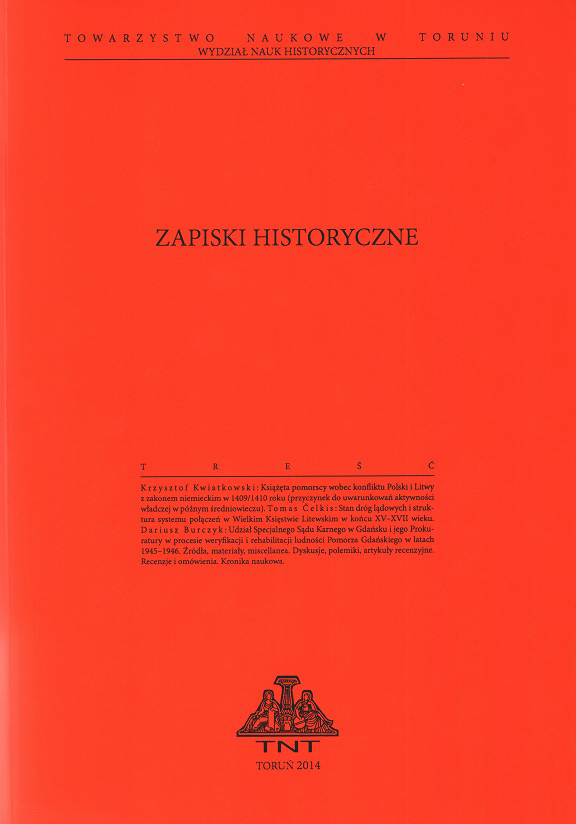Oficerowie wyznania ewangelickiego ze Śląska w armii szwedzkiej podczas wielkiej wojny północnej (1700 –1721)
Officers of the Evangelical faith from Silesia in the Swedish army during the Great Northern War (1700–1721)
Prolegomenon
Author(s): Adam WołoszynSubject(s): Diplomatic history, Military history, Political history, 18th Century, Source Material
Published by: Towarzystwo Naukowe w Toruniu
Keywords: Adam L.C. Lewenhaupt; Evangelical faith; Kingdom of Sweden; Charles XII; army; cavalry; infantry; officers; recruitment; Silesia;Great Northern War;
Summary/Abstract: The article constitutes a prolegomenon to the issue of the service of Silesian Evangelicals in the Swedish army during the Great Northern War (1700–1721), which has so far been absent in scholarly literature. The main objective of this text is to analyse their motives for joining the military service of the Kingdom of Sweden, as well as to trace their career and position in the officer corps. The above issue is part of the research on the officer corps of Charles XII’s army, and thus it may serve as an important point of reference also for the works devoted to the service of Polish and Lithuanian officers in the Swedish army of that period. A group of several dozen representatives of the Silesian nobility and aristocracy, whose members served in the rank of officers in various units of almost all the enlistments of the Swedish army (the largest number in the mercenary värvade regementen), throughout the whole war period (the most numerous in the period of 1703/1704–1709), mainly as the dragoons, and less often in other cavalry formations. The primary source for selection was a twovolume dictionary by Adam L.C. Lewenhaupt entitled Karl XII:s officerare. Biografiska anteckningar (Stockholm 1920–1921). Among the handwritten primary sources, the materials stored in Riksarkivet and Krigsarkivet were used, which primarily constitute records from the Royal Registry and military roles. They have been subjected to critical analysis in order to prepare possibly the most thorough biographies of officers of Evangelical faith from Silesia. A number of research methods have been used, such as the biographical, genealogical or statistical methods. The representatives of the following old and influential Silesian families were mentioned: von Ferentheil, von Franckenberg, von Holly, von Koschembahr and von Lindeiner. Among less significant families of the Silesian nobility, the representatives of the following families were scrutinised: Dumky, Görlitz, Hoffman, Kluge and Schmitt. An in-depth survey in Swedish, German, Austrian, Russian, Danish, Latvian and Estonian archives is necessary for further research. This is due to the fact that the representatives of the described group served in the armies of various states over the years, and were also imprisoned in various countries. The article significantly broadens the knowledge about the ways of recruiting officers by the Swedish army during the Great Northern War, and also brings us closer to the individual profiles of Evangelical officers from Silesia and the ways of their promotion. It also points out the importance of the representatives of this group among the commanders of the mercenary regiments (värvade regementen). As the text takes into account the historical political, military and religious situation, it allows to understand what drove the representatives of the described group to join the ranks of Swedish troops. Further survey in foreign archives, especially among specific documents, such as military roles and lists of prisoners of war, may bring a great deal of new information about the mentioned officers, and allow to identify those who were not included in the Lewenhaupt’s book. Undoubtedly, it will also constitute a starting point for the research on the service of officers from the Polish-Lithuanian Commonwealth in the Swedish army, whose number was significant in the examined period.
Journal: Zapiski Historyczne
- Issue Year: 84/2019
- Issue No: 4
- Page Range: 179-210
- Page Count: 31
- Language: Polish

